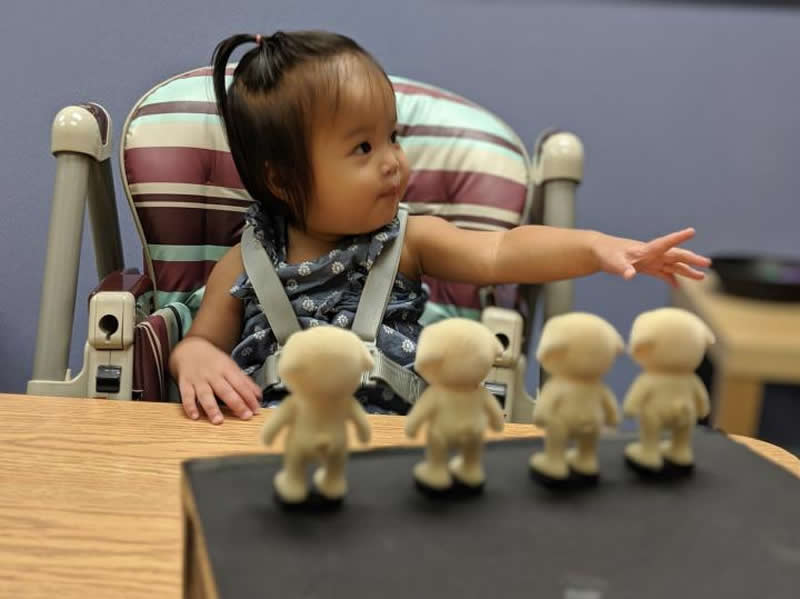Summary: Counting directs an infant’s attention to numerical aspects of their environment, proving they recognize counting as numerically relevant years before acquiring the meaning of number words.
Source: Johns Hopkins University
Babies who are years away from being able to say “one,” “two,” and “three” actually already have a sense of what counting means, Johns Hopkins University researchers have discovered.
The findings reveal that very early on, years earlier than previously believed, babies who hear counting realize that it’s about quantity.
“Although they are years away from understanding the exact meanings of number words, babies are already in the business of recognizing that counting is about number,” said senior author Lisa Feigenson, a cognitive scientist at Johns Hopkins who specializes in the development of numeric ability in children. “Research like ours shows that babies actually have a pretty sophisticated understanding of the world – they’re already trying to make sense of what adults around them are saying, and that includes this domain of counting and numbers.”
The findings are newly published in Developmental Science.
Most children don’t understand the full meaning of number words until they’re about four years old. That’s surprising, Feigenson said, considering how much counting young children are exposed to.
“We buy counting books for babies and we count aloud with toddlers. All of that raises the question: Are kids really clueless about what counting means until they’re in the preschool years?”
To find out, Feigenson and first author Jenny Wang, a former graduate student at Johns Hopkins who is slated to become an assistant professor at Rutgers University, worked with 14 and 18-month-old infants. The babies watched as toys, little dogs or cars, were hidden in a box that they couldn’t see inside of, but could reach into.
Sometimes the researchers counted each toy aloud as they dropped them into the box, saying, “Look! One, two, three, four – four dogs!” Other times the researchers simply dropped each toy into the box, saying, “This, this, this and this – these dogs.”

Without counting, the babies had a hard time remembering that the box held four things. They tended to become distracted after the researchers pulled just one out – as if there was nothing else to see. But when the toys were counted, the babies clearly expected more than one to be pulled from the box. They didn’t remember the exact but they did remember the approximate number.
“When we counted the toys for the babies before we hid them, the babies were much better at remembering how many toys there were,” Wang said. “As a researcher these results were really surprising. And our results are the first to show that very young infants have a sense that when other people are counting it is tied to the rough dimension of quantity in the world.”
The team is now conducting several follow-up studies, trying to determine if early counting practice leads to later number skills land if English-speaking babies react to counting in a foreign language.
Source:
Johns Hopkins University
Media Contacts:
Jill Rosen – Johns Hopkins University
Image Source:
The image is credited to Johns Hopkins University.
Original Research: Closed access
“Infants recognize counting as numerically relevant”. Jinjing (Jenny) Wang and Lisa Feigenson.
Developmental Science doi:10.1111/desc.12805.
Abstract
Infants recognize counting as numerically relevant
Children do not understand the meanings of count words like “two” and “three” until the preschool years. But even before knowing the meanings of these individual words, might they recognize that counting is “about” the dimension of number? Here in five experiments, we asked whether infants already associate counting with quantities. We measured 14‐ and 18‐month olds’ ability to remember different numbers of hidden objects that either were or were not counted by an experimenter before hiding. As in previous research, we found that infants failed to differentiate four hidden objects from two when the objects were not counted—suggesting an upper limit on the number of individual objects they could represent in working memory. However, infants succeeded when the objects were simply counted aloud before hiding. We found that counting also helped infants differentiate four hidden objects from six (a 2:3 ratio), but not three hidden objects from four (a 3:4 ratio), suggesting that counting helped infants represent the arrays’ approximate cardinalities. Hence counting directs infants’ attention to numerical aspects of the world, showing that they recognize counting as numerically relevant years before acquiring the meanings of number words.







